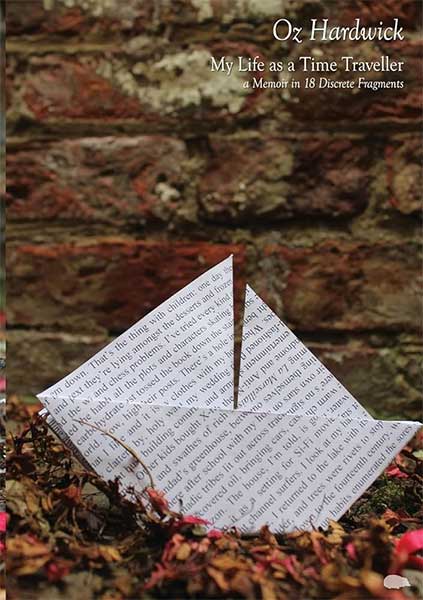
My Life as a Time Traveller, Oz Hardwick (28pp, pbck, Hedgehog Press)
The title of Oz Hardwick’s new collection of prose poems, My Life as a Time Traveller, points us in the direction of the optimum state of mind in which to read it. It nudges us to see the extraordinary in the every-day. In this case, how we might marvel at the thought of time travel, yet overlook the fact that we are, indeed, all time travellers, albeit all travelling in the same direction at once. When we hanker after the ability to travel in time, what we’re really wishing for is the ability to control our movement through it ourselves. (That said, from what I’ve read and seen of Oz Hardwick’s work, I think he’d make a great Dr Who). Similarly, we might fantasize about travelling through space on a space ship, while forgetting that that’s what we’re actually doing, and speculate as to the fantastical possibilities of life on other planets while not seeing the fantastical world of life that surrounds us on this one. It’s one of the jobs of the poet to put this right.
The collection is subtitled a Memoir in 18 discrete fragments’ and the poems begin at the beginning: in the first, as the poet says, ‘I was bud the potential.’ The text buzzes with metaphor and word-play. I could hear echoes (though one obviously doesn’t need to listen out for them) of Joyce and e.e. cummings. In the second poem, ‘Daphne in the Edgelands’, classical mythology and psychogeography collide (Daphne being the naiad who turned into a tree). We progress from bud to leaf. Oz-Daphne is ‘a Realist novel with neither character nor conclusion; a looped tape, echoing itself.’ Time passes and by the fourth poem, the poet is harking back to a time ‘before I sought out awkward questions, from a time when I thought I knew what was going on.’ By the next, he’s recalling a new wave film he saw in the 1970s. I was left wanting to know what it was and to see it: is it a real film, or did the poet invent the details? A little later on, we find the poet making the origami boat used in the book’s cover-art. I could say more, but to do so might undermine the magic. Similarly, there’s some pretty dark, gothic stuff coming up soon after that, but I’d hate to spoil the surprise.
As anyone who reads his regular contributions to IT already knows, when Hardwick conveys reality he does so with a surrealist edge. Reading him, the ground is always shifting beneath your feet. In the poem ‘Shell’ he begins by saying ‘When I open my inbox there’s a handful of shells.’ Of course, it’s not impossible – is somebody sending him photographs? – but we’re on the alert. As the narrative unfolds, there’s talk of postcards, so it seems we were right. However, when the egg-shells he tiptoes on crack open to reveal their contents, we realise we’ve left everyday reality behind. This grey area between reality and the impossible is Hardwick’s prose-poetic comfort zone. Navigating it, he often conveys reality with an intensity mere realism finds difficult to match.
In ‘Hooray for Hollywood’ we’re back in the world of the covid lockdowns. The poet hunkers down with his cat, who, while objecting to the odour of his hand sanitiser, happily curls up in his stockpile of toilet paper. As usual, the poetry manages to be both playful and serious at the same time although, from here on, for the last few poems, the book has a slightly more melancholic air. What began as a song of innocence has turned into a song of experience. And it doesn’t get much darker than ‘Painting by Numbers’, in which ‘everything is that colour between Sunday night and Monday morning.’ In the next poem, he discovers he’s ‘in the wrong skin’: if he were a glove puppet, he says, the hand inside him would still be that of a child – the source, presumably, of that playfulness that pervades his poetry. It’s easy to think of the glove-puppet as the time machine and the hand inside it, the traveller. In the final, defiantly positive poem, he tells us that, when he retires, he’ll ‘make friends with the albatross around [his] neck.’ Perhaps I’m showing my age when I say this struck me as a particularly resonant idea.
My Life as a Time Traveller is a great read and a book I definitely hope to come back to as I continue on what’s left of my one-way trip.
My Life as a Time Traveller is available from here:
Dominic Rivron
